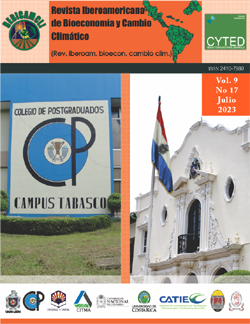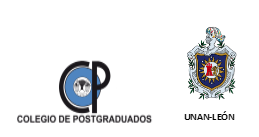Estrategia organizacional del sector agropecuario de Nicaragua frente al cambio climático
DOI:
https://doi.org/10.5377/ribcc.v9i17.16359Palabras clave:
Mitigacion, Adaptacion, Soberania Alimentaria, Politicas publicas, Bioeconomia AgroecologicaResumen
Antecedentes: La Mesa Nacional de Agroecología y Suelo (MAES) es una iniciativa liderada por el Gobierno de Reconstrucción y Unidad Nacional de Nicaragua (GRUN) a través del Instituto Nicaragüense de Tecnología Agropecuaria (INTA), con el propósito de la implementación de un modelo organizacional de carácter interinstitucional para gestionar los impactos provocados por el cambio climático en el sector agropecuario. La investigación se focalizó en la sistematización de experiencias y buenas prácticas validadas para la adaptación al cambio climático, que se han venido implementando desde la MAES. Metodología: para la sistematización de las experiencias, se utilizó la metodología de estudio de casos múltiples. Resultados: Los resultados evidencian que las estrategias y prácticas, que desde la MAES se están promoviendo, fortalecen las capacidades institucionales del sector agropecuario y amplían las opciones tecnológicas para las y los productores en el fomento de la Bioeconomia Agroecológica como una alternativa viable para el desarrollo sostenible del sector agropecuario en Nicaragua. Conclusiones: La MAES destaca las fortalezas, funciones, roles y responsabilidades de las instituciones. Una segunda conclusión es las estrategias son una experiencia referente para America Latina. La tercera conclusión es el enfoque de la bioeconomía agroecología en la gestión de políticas públicas y finalmente, el espacio de articulación inclusiva en la transformación del sector agropecuario de Nicaragua.
Descargas
1267
HTML 0
Citas
Acuerdo de París (2015). (https://unfccc.int/files/meetings/paris_nov_2015/ application/pdf/paris _agreement_spanish_.pdf, verificado 01/junio/2023)
Altieri, M., Nicholls, C. (2013). Agroecologia y Resiliencia al Cambio Climático: Principios y consideraciones metodológicas. Revista Agroecologia 8 (1):7-20.
Altieri, M.A, Nicholls, C. I., Henao, A. and Lana, M.A. (2015). Agroecology and the design of climate change-resilient farming systems. Agronomy for Sustainable Development 35(3), 869–890. doi:10.1007/s13593-015-0285-2
Altieri, M. A., & Nicholls, C. I. (2018). Agroecología y cambio climático:¿ adaptación o transformación?. Revista de Ciencias Ambientales, 52(2), 235-243.
CEPAL, N. (2010). Estudio Económico de América Latina y el Caribe 2009-2010: impacto distributivo de las políticas públicas. Cepal.
Colon-García, A. P., Catari-Yujra, G., & Alvarado, E. (2021). Los senderos productivos de la bioeconomía: El caso Honduras. Revista Iberoamericana de Bioeconomía y Cambio Climático, 7(14), 1713-1726.
Carrión, G. A. C. (2006). La calidad en los métodos de investigación cualitativa: principios de aplicación práctica para estudios de casos. Cuadernos de Economía y Dirección de la Empresa, (29), 57-82.
Cuarta comunicación nacional sobre cambio climático república de Nicaragua (2023). (https://unfccc.int/sites/default/files/resource/4CN-Nicaragua.pdf, Verificado 28/mayo/2023)
Durán, M. M. (2012). El estudio de caso en la investigación cualitativa. Revista nacional de administración, 3(1), 121-134.
ETC Group. (2017). Who will feed us? The Peasant Food Web vs. the Industrial Food Chain. Recuperado a partir de http://www.etcgroup.org/whowillfeedus
EU COMMISSION (2007): En route to the Knowledge-based Bio-economy, Bruselas, European Commission, 1-23l.
EU COMMISSION (2010): The Knowledge-based bio-economy (KBBE) in Europe: achievements and challenges, Bruselas, Flemish Government 1-68l.
Figueroa Ugalde, J. H., Lagarda-Leyva, E. A., & Celaya-Figueroa, R. (2022). Fundamentos de la sustentabilidad en la bioeconomía y su relación con las teorías administrativas. Rev. Iberoam. Bioecon. Cambio Clim., 8(15), 1806–1821. https://doi.org/10.5377/ribcc.v8i15.14183
Field, C. B., Barros, V. R. et al. (2014). IPCC, 2014: Climate change 2014: Impacts, adaptation, and vulnerability. Part A: Global and sectoral aspects. Contribution of working Group II to the fifth assessment report of the intergovernmental panel on climate change. Nueva York: Cambridge University Press.
FAO Organización de las Naciones Unidas para la Agricultura y la Alimentación. (2008). Informe del estado del suelo en el mundo. Sala de prensa oficina principal Roma-Italia.
FAO Organización de las Naciones Unidas para la Agricultura y la Alimentación. (2018). La agroecología y los Objetivos de Desarrollo Sostenible (ODS).. (https://www.fao.org/agroecology/overview/agroecology-and-the-sustainable-development-goals/es/,verificado 05/junio/2023)
Fischer, G., M. Shah, F. N. Tubiello y H. Van Velhuizen (2005), “Socio-economic and Climate Change Impacts on Agriculture: An Integrated Assessment, 1990-2080”, Philosophical Transactions of the Royal Society B: Biological Sciences, vol. 360, núm. 1463, pp. 2 067-2083.
Fernández, C., y Salmeron-Miranda, F. (2017). La Agroecologia marco conceptual. En Vivas, Murillo y López (Ed.) AGROECOLOGIA. Herramienta para la transformación social-ecológica de la agricultura en Nicaragua/Jairo Rojas y Francisco Salmeron. Managua, Nicaragua. Fundación Friedrich-Ebert-Stiftung, pp-11-19.
Flores, C. y Sarandón, S., (2014). Agroecología: un paradigma alternativo al modelo convencional de Agricultura Intensiva. En: D. Melón (coord.), La Patria Soyera: el modelo agrosoyero en el Cono Sur. Buenos Aires: El Colectivo, pp. 91-106.
Georgescu-Roegen, N., Naredo, J. M., & Grinevald, J. (1996). La ley de la entropía y el proceso económico (No. BOOK). Madrid: Fundación Argentaria.
García, A., Laurín, M., Llosá, M. J., Gonzálvez, V., Sanz, M. J., & Porcuna, J. L. (2008). Contribución de la agricultura ecológica a la mitigación del cambio climático en comparación con la agricultura convencional. Revista Agroecologia, 1, 7-88. (https://revistas.um.es/agroecologia/article/view/169, verificado 28/mayo/2023)
Gonzálvez, V., Raigón, M. D., Neira, X. X., García, C., Pajarón, M., & Ochoa, J. (2016). Bioeconomía agroecológica. Documento de trabajo. Disponible en http://www.conama11.vsf.es/conama10/download/files/conama2016/CT%202016/1998973622.pdf Visitado el 15 de Junio 2023.
Gonzálvez, V., Cifre, H., Raigón, M. y Gómez, M. (2018). Practicas agroecológicas de adaptación al cambio climático. Estudio Diagnostico. Proyecto Adapta Agroecología. Sociedad Española de Agricultura Ecológica/Agroecologia SEAE.
Informe Especial sobre Escenarios de Emisiones (IEEE), (2000). Intergovernmental Panel on Climate Change (IPCC). Informe especial del IPCC - escenarios de emisiones. Grup. Intergub. Expert. sobre el Cambio Climático 27p. ISBN: 92-9169-413-4.
Intergovernmental Panel on Climate Change (IPCC), (2007). Climate Change 2007: Impacts, Adaptation and Vulnerability. Contribution of Working Group II to the Fourth Assessment Report of the Intergovernmental Panel on Climate Change, Annex I., M.L. Parry, O.F. Canziani, J.P. Palutikof, P.J. van der Linden y C.E. Hanson, Eds., United Kingdom y New York, USA, Cambridge University Press.
Intergovernmental Panel on Climate Change (IPCC), (2018): Summary for Policymakers. In: Global Warming of 1.5°C. An IPCC Special Report on the impacts of global warming of 1.5°C above pre-industrial levels and related global greenhouse gas emission pathways, in the context of strengthening the global response to the threat of climate change, sustainable development, and efforts to eradicate poverty [Masson-Delmotte, V., P. Zhai, H.-O. Pörtner, D. Roberts, J. Skea, P.R. Shukla, A. Pirani, W. Moufouma-Okia, C. Péan, R. Pidcock, S. Connors, J.B.R. Matthews, Y. Chen, X. Zhou, M.I. Gomis, E. Lonnoy, T. Maycock, M. Tignor, and T. Waterfield (eds.)]. Cambridge University Press, Cambridge, UK and New York, NY, USA, pp. 3-24, doi:10.1017/9781009157940.001.
López Feldman, A. J., & Hernández Cortés, D. (2016). Cambio climático y agricultura: una revisión de la literatura con énfasis en América Latina. El trimestre económico, 83(332), 459-496.
Lasso, A., de Oliveira Jr, C. J. F., Gomes, R. J. B., Campos, R. P., Bortolotto, I. M., & Fehlauer, T. J. (2023). BIoeconomia e sociobiodiversidade na perspectiva agroecológica para o bem viver. Revista Brasileira de Agroecologia, 18(1), 129-150.
Magrin, G. O., J. A. Marengo, J.-P. Boulanger, M. S. Buckeridge, E. Castellanos y S. Vicuña (2014), “Central and South America”, en V. R. Barros, C. B. Field, D. J. Dokken, M. . Mastrandrea, K. J. Mach, T. E. Bilir y L. L. White (eds.), Climate Change 2014: Impacts, Adaptation, and Vulnerability. Part B: Regional Aspects. Contribution of Working Group II to the Fifth Assessment Report of the Intergovernmental Panel on Climate Change, Cambridge University Press/Cambridge, Reino Unido/Nueva York, pp. 1499-1566.
Mendelsohn, R., y M. E. Schlesinger (2009), “The Impact of Climate Change on Agriculture in Developing Countries”, Journal of Natural Resources Policy Research, vol. 1, núm. 1, pp. 5-19.
Mendelsohn, R. O., Emanuel, K., & Chonabayashi, S. (2011). The impact of climate change on hurricane damages in the United States. World Bank Policy Research Working Paper, (5561).
Mendelsohn, R., & Dinar, A. (1999). Climate change, agriculture, and developing countries: does adaptation matter?. The World Bank Research Observer, 14(2), 277-293.
Muñiz, M. (2010). Estudios de caso en la investigación cualitativa. División de estudios de posgrado universidad autónoma de nuevo León. Facultad de psicología. México, 1-8.
Monge, E. C. (2010). El estudio de casos como metodología de investigación y su importancia en la dirección y administración de empresas. Revista Nacional de administración, 1(2), 31-54.
Mendizábal, N. (2018). La osadía en la investigación: el uso de los Métodos Mixtos en las ciencias sociales. Espacio abierto: cuaderno venezolano de sociología, 27(2), 5-20.
Sánchez, L y Reyes, O. (2015). Medidas de adaptación y mitigación frente al cambio climático en América Latina y el Caribe. Una revisión general. Comisión Económica para América Latina y el Caribe (CEPAL). (http://repositorio.cepal.org/bitstream/handle/11362/39781/S1501265es.pdf?sequence=1&isAllowed=y, verificado 01/junio/2023).
Tercera comunicación nacional de cambio climático Nicaragua (2018). (https://cambioclimatico.ineter.gob.ni/Tercera%20Comunicaci% C3%B3n%20 Nicaragua.pdf, verificado 04/junio/2023).
Toruño, P. J., Zuniga-Gonzalez, C. A., Castellón, J. D., Hernández-Rueda, M. J., & Gutierrez-Espinoza, E. I. . (2022). Identificación de los Senderos productivos de la Bioeconomia en Universidades del CNU y sector agropecuario. Rev. Iberoam. Bioecon. Cambio Clim., 8(16), 1929–1946. https://doi.org/10.5377/ribcc.v8i16.15016
Zuniga-González, C. A., López, M., Icabalceta, J., Vivas-Viachica, E., & Blanco-Orozco, N. (2022). Epistemología de la Bioeconomia. Rev. Iberoam. Bioecon. Cambio Clim., 8(15), 1786–1796. https://doi.org/10.5377/ribcc.v8i15.13986
Vargas-Hernández, J. G., Pallagst, K., & Hammer, P. (2018). Bio economía en la encrucijada del desarrollo sostenible. Rev. Iberoam. Bioecon. Cambio Clim., 4(7), 800–815. https://doi.org/10.5377/ribcc.v4i7.5952
Publicado
Cómo citar
Licencia
Derechos de autor 2023 Rev. iberoam. bioecon. cambio clim.

Esta obra está bajo una licencia internacional Creative Commons Atribución-NoComercial-CompartirIgual 4.0.
Copyright © Rev. iberoam. bioecon. cambio clim. (Colegio Postgraduados y UNAN-León, Escuela de ciencias agrarias y veterinarias/ Departamento de Agroecología/Centro de Investigación en Bioeconomía y Cambio Climático (CIByCC).







